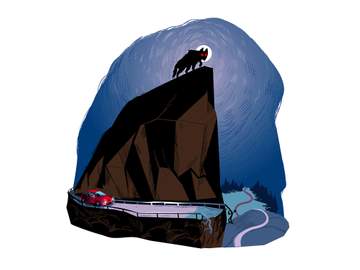
‘App’
Lookups for app rose in the wake of a speech given by former president Donald Trump that featured the word, and was subsequently reported on and discussed on social media.
He once again called out the U.S. Customs and Border Protection (CBP) app—a mobile application that hosts a single portal to multiple CBP services, including a space for immigrants to schedule appointments to present themselves at a port of entry and for carriers to request cargo inspections. “They have a phone app so that people can come into our country… these are smart immigrants, I guess, because most people don’t have any idea what the hell a phone app is,” Trump said at the Prairie Du Chien Area Arts Center in Prairie Du Chien, a city of about 5,500 people along the Mississippi River.
— Rebecca Schneid, Time, 29 Sept. 2024
We define the relevant sense of the noun app as a shortened form of application, referring to a program that performs a particular task or set of tasks, and especially such a program designed for a mobile device (such as a smartphone). App is also sometimes used as an informal synonym of appetizer.
‘Moon’
Lookups for moon often wax and wane, but have been on the rise lately, likely in response to news about a “mini moon” currently (and temporarily) in Earth’s orbit.
A second moon orbiting a planet may seem like something out of a science fiction novel. But a second “moon” entered Earth’s orbit Sunday and will loop around the planet until late November. This so-called “mini moon” is an asteroid about 10 meters in diameter, according to The Scientific American. Dubbed Asteroid 2024 PT5, it was initially spotted in South Africa in early August by the Asteroid Terrestrial-impact Last Alert System. It belongs to the Arjuna asteroid belt that follows Earth-like orbits around the sun.
— Mike Kramer, The Peoria (Illinois) Journal Star, 1 Oct. 2024
The word moon hails from the Old English mōna. English speakers use moon most often to refer specifically to Earth’s sole natural satellite and nearest large celestial body, but it carries other meanings as well. The sense of moon employed when referring to Asteroid 2024 PT5 as such is synonymous with the sense of satellite meaning “a celestial body orbiting another of a larger size.” We define asteroid as “any of the small rocky celestial bodies found especially between the orbits of Mars and Jupiter.”
‘Fickle’
Tuesday night’s vice presidential debate between Governor Tim Walz of Minnesota and Senator JD Vance of Ohio led to spikes in lookups for many words, including fickle.
“Iran is closer to a nuclear weapon than they were before, because of Donald Trump’s fickle leadership,” Walz said. Trump has said Iran has been targeting him as supposed payback over his former administration's hardline tactics, including pulling out of the Iranian nuclear deal. In 2018, Trump decided to re-impose sanctions on Tehran, saying the deal, negotiated under former President Barack Obama, was “horrible, one-sided.” The move angered allies.
— Kinsey Crowley, USA Today, 1 Oct. 2024
The adjective fickle is used to describe people or things that are marked by a lack of steadfastness, constancy, or stability; in other words, “given to erratic changeableness.” It comes from the Middle English word fikel, meaning “deceitful” or “inconstant,” which in turn descends from the Old English ficol, meaning “deceitful.”
‘Czar’
Czar is another word that saw increased lookups during the vice presidential debate.
Vance echoed Trump by repeatedly calling Harris the “border czar” and suggested that she, as vice president, single-handedly rolled back the immigration restrictions Trump had imposed as president. The result, in Vance’s telling, is an unchecked flow of fentanyl, strain on state and local resources and increased housing prices around the country. Harris was never asked to be the “border czar” and she was never specifically given the responsibility for security on the border.
— Bill Barrow, et al., The St. Paul (Minnesota) Pioneer Press, 2 Oct. 2024
We provide two definitions for czar: “emperor (specifically, the ruler of Russia until the 1917 revolution),” and “one having great power or authority.” This latter sense, which often is used in reference to one to whom great authority has been delegated, is the one applicable to Trump and Vance’s invocation. The “emperor” sense of the word is the older, in use since the middle of the 16th century. Czar took on its extended meaning in the middle of the 19th century. On its way to English from the Latin Caesar, czar has passed through may languages, including the Goth kaisar and Old Russian tsĭsarĭ. The Russian tsar is alternate spelling of czar.
Word Worth Knowing: ‘Guytrash’
Even if you’ve never heard the word before, we’re sure you’re likely familiar with the concept behind guytrash. No, we don’t mean piles of empty pizza boxes and energy drink bottles (rim shot) but rather a specter or ghost, especially in the form of an animal (usually a spooky doggo, but guytrashes can assume other animal forms as well). The earliest known use of guytrash in print (spelled gytrash) is from 1847, when none other than Charlotte Brontë included it in Jane Eyre.
There is a certain type of phantom that has a definite leaning toward the north of England. It is called a ‘Guytrash’, and takes the form of either a large dog or a riderless horse.
— Peggy Hewitt, These Lonely Mountains: A Biography of the Brontë Moors, 1985




